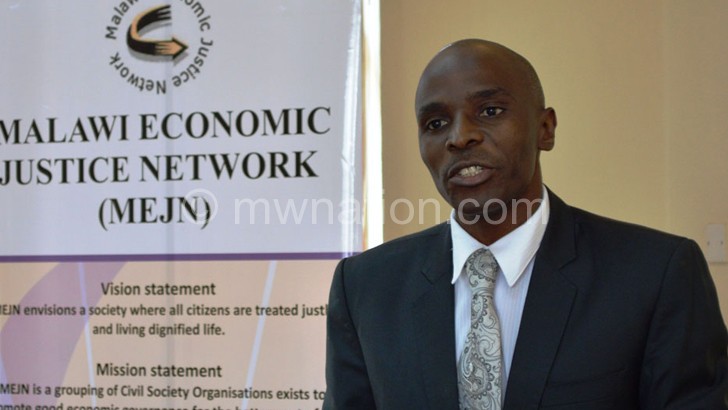Mejn tells MPs to probe, expose budget lies
Malawi Economic and Justice Network (Mejn) has asked members of Parliament (MPs) to stop rubber-stamping national budgets and start seriously probing and exposing lies embellished in the financial plans if the country if to develop.
In the absence of a critical analysis, Mejn warned, ordinary Malawians will continue to get a raw deal and wallow in poverty.

Mejn delivered its hard-hitting message through a budget analysis report its executive director Dalitso Kubalasa shared with members of Parliament’s Budget and Finance Committee at Parliament Building in Lilongwe on Thursday evening.
Mejn’s report was titled Malawi, Moving Towards Hope or Oblivion?
The ‘wake-up call’ came as the seven-week 2016/17 Budget Meeting of Parliament is expected to wind up its business on July 8 2016.
On May 27 2016, Minister of Finance, Economic Planning and Development Goodall Gondwe unveiled a record-high proposed national budget of K1.136 trillion, the latter word turning out to be a new reality among most Malawians who had been used to touting about the gradually-increasing billions of kwacha in their yearly budgets.
Presenting the Mejn report, Kubalasa stressed the need for the MPs to seriously hold the government accountable to the budget details and implementaion, particularly now that a worrying trend has emerged, over several years, that shows that many budget facts and figures seem not to add up.
He pointed out that the 2016/17 budget framework shows ill trends of high inflation, averaging 21 percent, high interest rates, averaging above 40 percent, the depreciating kwacha, unpredictable donor in-flows and one of the worst food insecurity in the country.
Kubalasa’s report laid bare many anomalies, including poor budget sector allocations, the bloating public debt and how ordinary Malawians are seriously short-changed through the ad hoc formulation, distribution and poor quality projects.
He pointed out that the greatest problem is that budgets seem embellished and have unrealistic revenue collection projections perpetrated by the consistent under-performance of the key revenue collector, Malawi Revenue Authority (MRA).
According to the report, in the 2014/15 financial year, for example, domestic revenue collection fell short of the target by K54 billion. The report adds that in 2015/16, the actual tax and non-tax revenues decreased by K10.3 billion and K2.1 billion respectively and grants, initially projected at K97.1 billion, were adjusted upwards to K130 billion at mid-year.
The report notes that government is projecting a significant budget growth based on collections from the capacity-challenged MRA, despite its failure to live up to its targets in the previous years.
Reads the Mejn report: “Speaking hypothetically, when we say we have target ‘X’ for MRA, we shouldn’t be far from reality. But, sometimes, some projections we have seen put to question the integrity of the data in budgets.
“Is it that the budget projections are for two different reports going to two different audiences? Is one of the reports meant specifically for an audience we want to please and impress and the other one bearing realities on the ground? In our quest for transparency and accountability for development, let’s be sincere; if things are bad, let’s say so, so that we quickly figure out how to manage them.”
On debt management, Mejn notes that Malawi’s debt is creeping up to alarming levels, even surpassing the debt levels just after debt cancellation in 2006.
Said Kubalasa: “Let us call a spade a spade. If our domestic debt is ballooning, let us bring out those figures [for a search in solutions].”
As of end June, 2014, the total public debt as a proportion to nominal growth domestic product (GDP) was estimated at 66 percent, compared to 38 percent by June 2013, but is much higher now.
Speaking after members of his committee had commented on the Mejn report and got clarifications and enlightenment from Mejn programme manager Tony Milanzi, Budget and Finance Committee chairperson Rhino Chiphiko commended Mejn “for being a trusted partner” in helping his committee members to interrogate the budget meaningfully every year.
He said the Mejn report was an eye-opener and confirmed the deep economic woes the country is facing.
Said Chiphiko: “Everyone is worried whether MRA will be able to raise the [projected] K708 billion, given the grim economic indicators out there. We are essentially looking at an economy that is in crisis and in an ICU [intensive care unit], kind of.”
He expressed further regret that vital ministries of education and health are among those whose budgets have been reduced in the budget.





